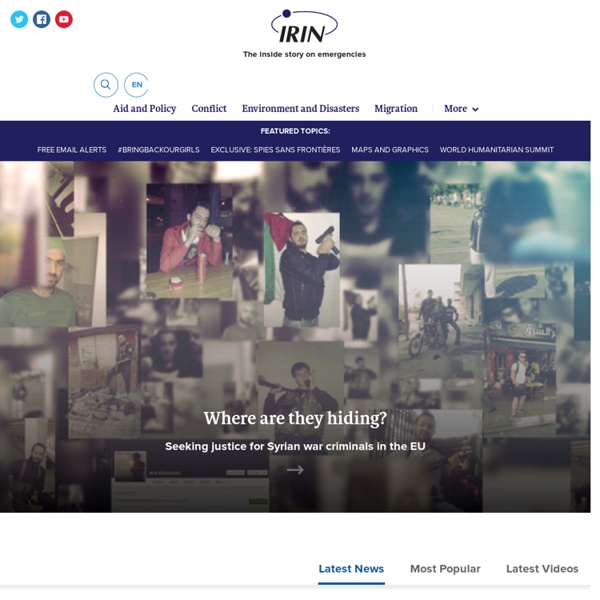



http://www.irinnews.org/content/irin-humanitarian-news-analysis-home-page
Water Wise - Water Conservation and Education Campaign by Rand Water "Water Wise" is Rand Water's environmental brand. It is a campaign aimed at increasing awareness of the need to value water and to use it wisely. South Africa is a water stressed country, and the water resources are under tremendous pressure from a growing population, ongoing development, pollution, wetland destruction, alien invasive plants and the effects of global warming. The amount of water available for use remains the same, and despite plans to increase storage capacity through the building of new dams or water transfer schemes, predictions are that the demand for water will outstrip supply by 2025. The only answer to this dilemma lies in changing people's attitude and thus their behaviour to use water more wisely, and in this regard Rand Water’s “Water Wise” campaign is visionary.
Activités de l'Union européenne - Aide humanitaire L'Union européenne est présente dans les zones en crise dans le monde entier, et notamment en Syrie, en Afghanistan, dans les territoires palestiniens occupés et dans de nombreuses régions d'Afrique, d'Amérique centrale et du Sud et du Sud-Est asiatique. Elle mène également des opérations de secours dans des zones qui sont en crise depuis longtemps et dans d'autres où les conflits ont fait place à l'instabilité. Ventilation de l'aide humanitaire par secteur (2011). ECHO entre en scène
Water, sanitation & hygiene Women and girls from remote mountain villages in North Vietnam walk up to three hours a day to haul water back to their houses for cooking. Here in Australia we turn on our taps. Fresh, clean accessible water for drinking and for cooking. We all need it, only some of us have to go to the limits of human endurance to get it. Almost 900 million people in the world do not have access to clean water – or one in eight people.
Blog CICR Food and Agriculture Organization of the United Nations FAO's role in water Agriculture faces complex challenges between now and 2050 to satisfy an estimated population of nine billion. One certainty, however, is that more water will be needed to produce the estimated 60% of extra food needed. FAO’s work in water focuses on a more efficient, equitable and environmentally friendly use of water in agriculture. Issues around water that need to be addressed include:
Kosovo and the challenge of ... Water, Sanitation and Hygiene According to the latest estimates of the WHO/UNICEF Joint Monitoring Programme for Water Supply and Sanitation (JMP), 32 per cent of the world’s population – 2.4 billion people – lacked improved sanitation facilities, and 663 million people still used unimproved drinking water sources in 2015 Inadequate access to safe water and sanitation services, coupled with poor hygiene practices, kills and sickens thousands of children every day, and leads to impoverishment and diminished opportunities for thousands more. Poor sanitation, water and hygiene have many other serious repercussions. Children – and particularly girls – are denied their right to education because their schools lack private and decent sanitation facilities. Women are forced to spend large parts of their day fetching water. Poor farmers and wage earners are less productive due to illness, health systems are overwhelmed and national economies suffer.
Water and sanitation The right to water and sanitation Water is the source of life – vital for health, food and economic development. Without sufficient and affordable clean water and access to adequate toilet and washing facilities, people suffer a range of illnesses. As a result, they may be unable to work or attend school. Without water to grow crops people may go hungry. Without health and education people have less chance of earning an income and become trapped in a brutal cycle of illness and poverty. School resources search results 15 search results for "water" Water in India Poster Poster of a girl in India washing her lunch plate at her school’s water pump.